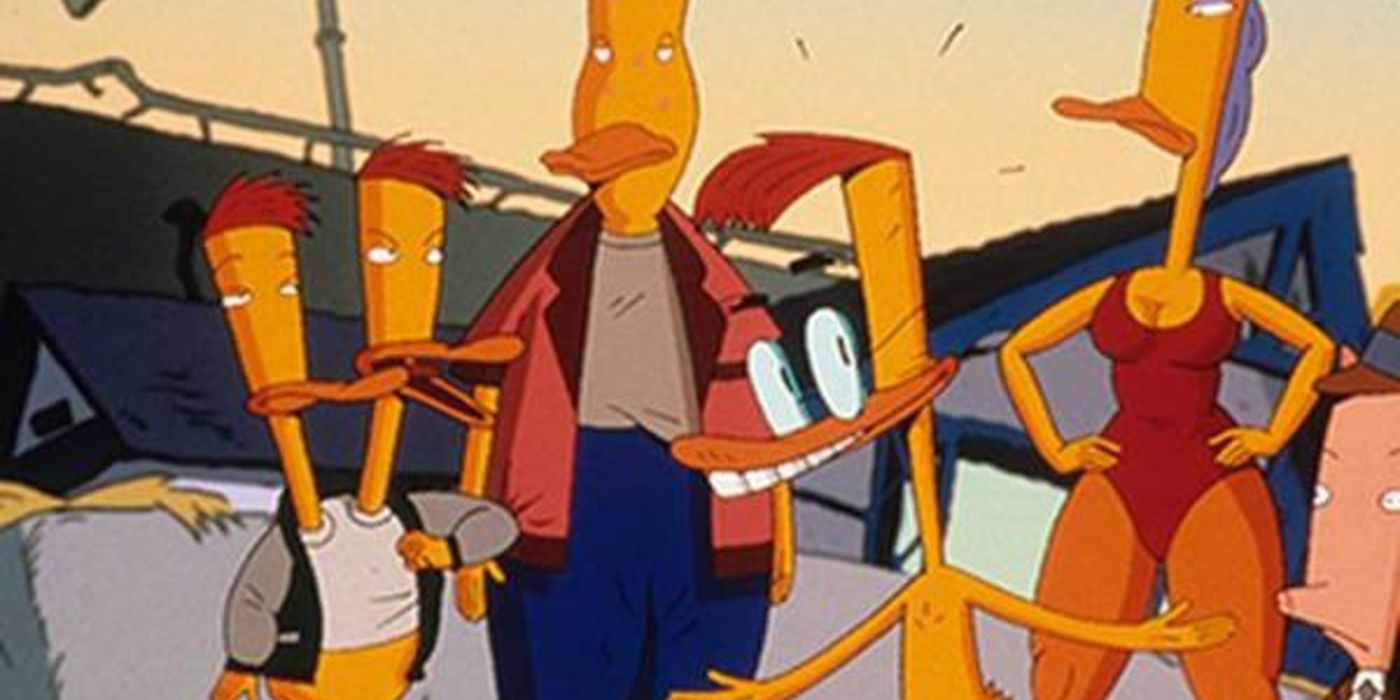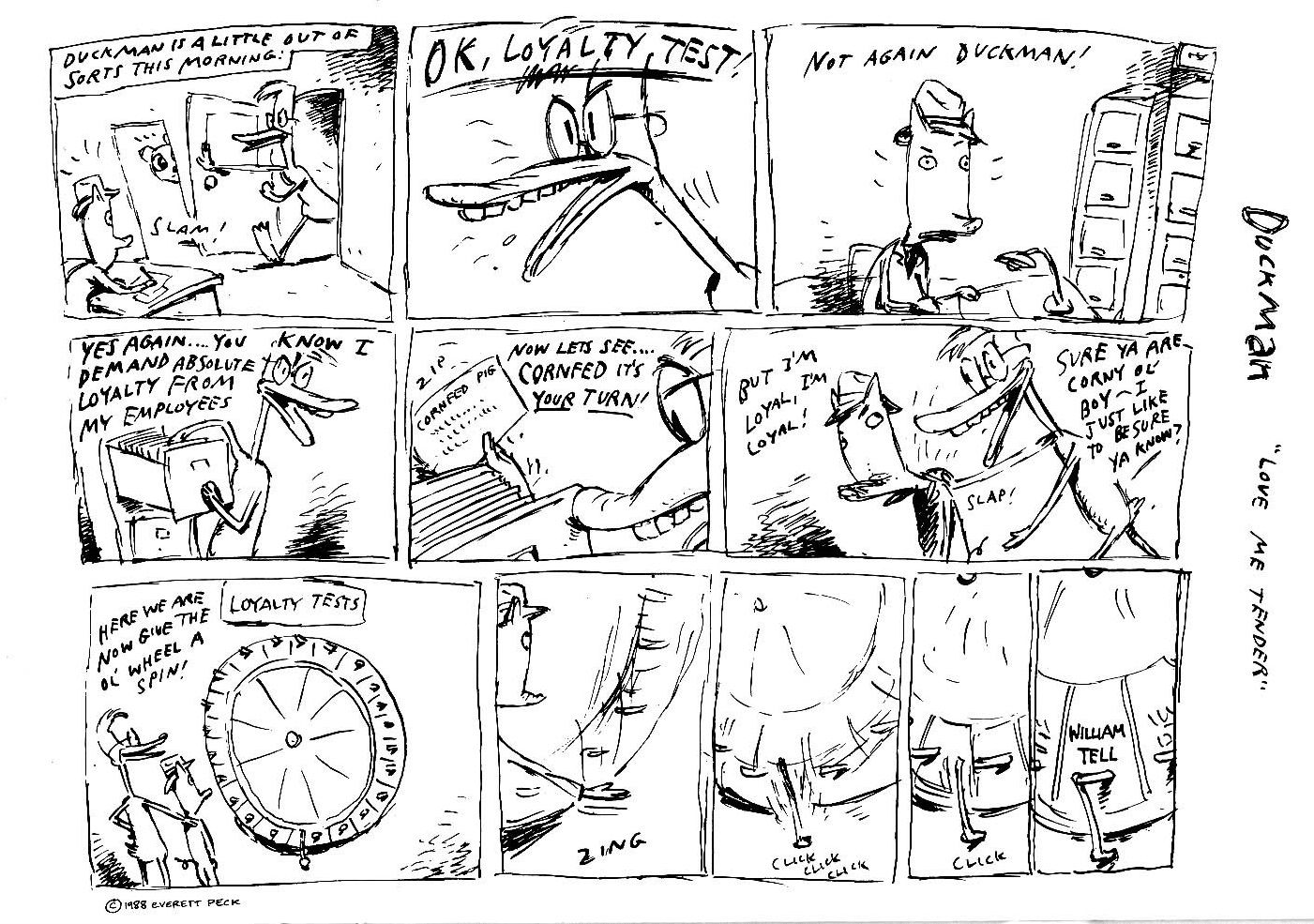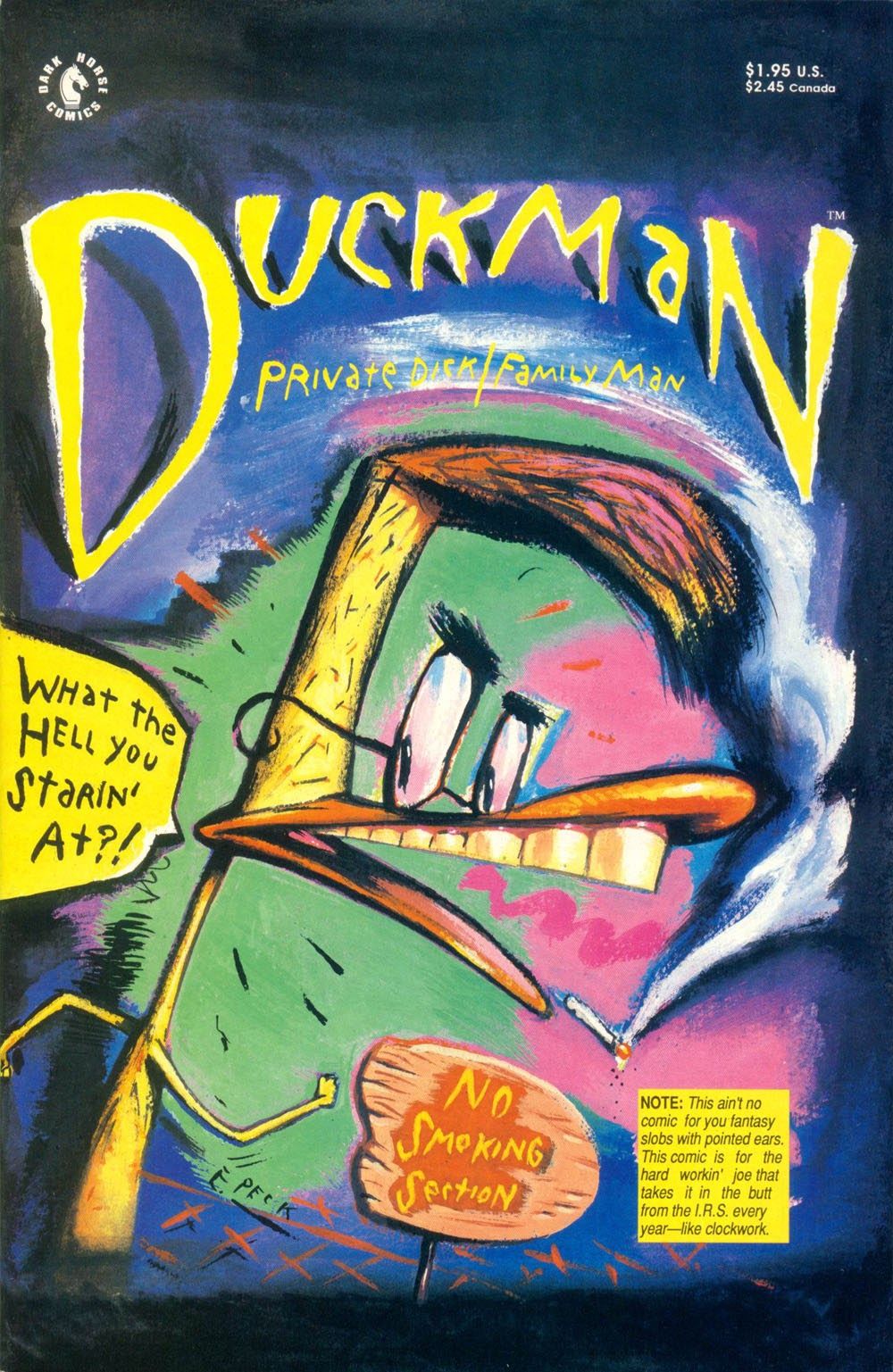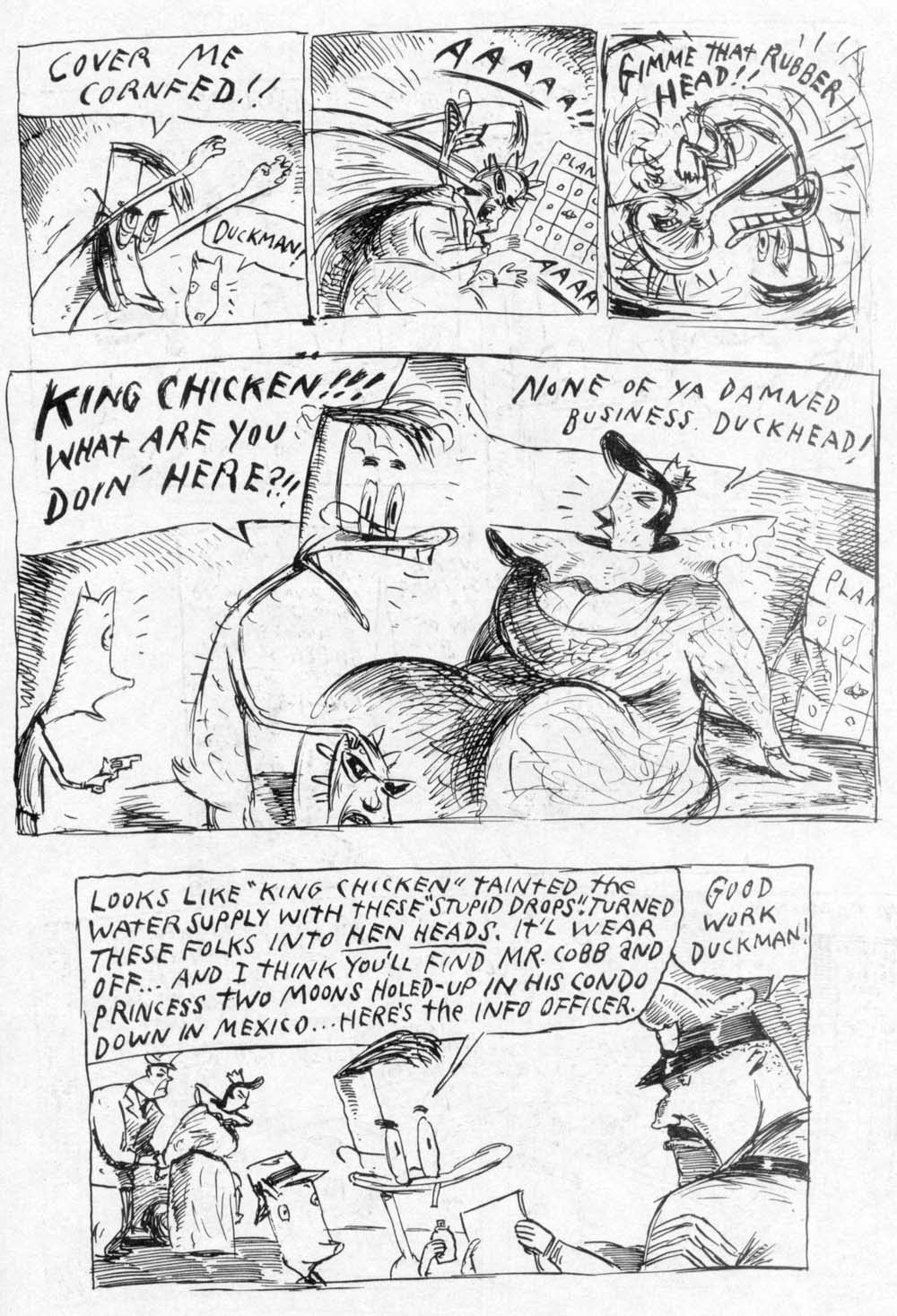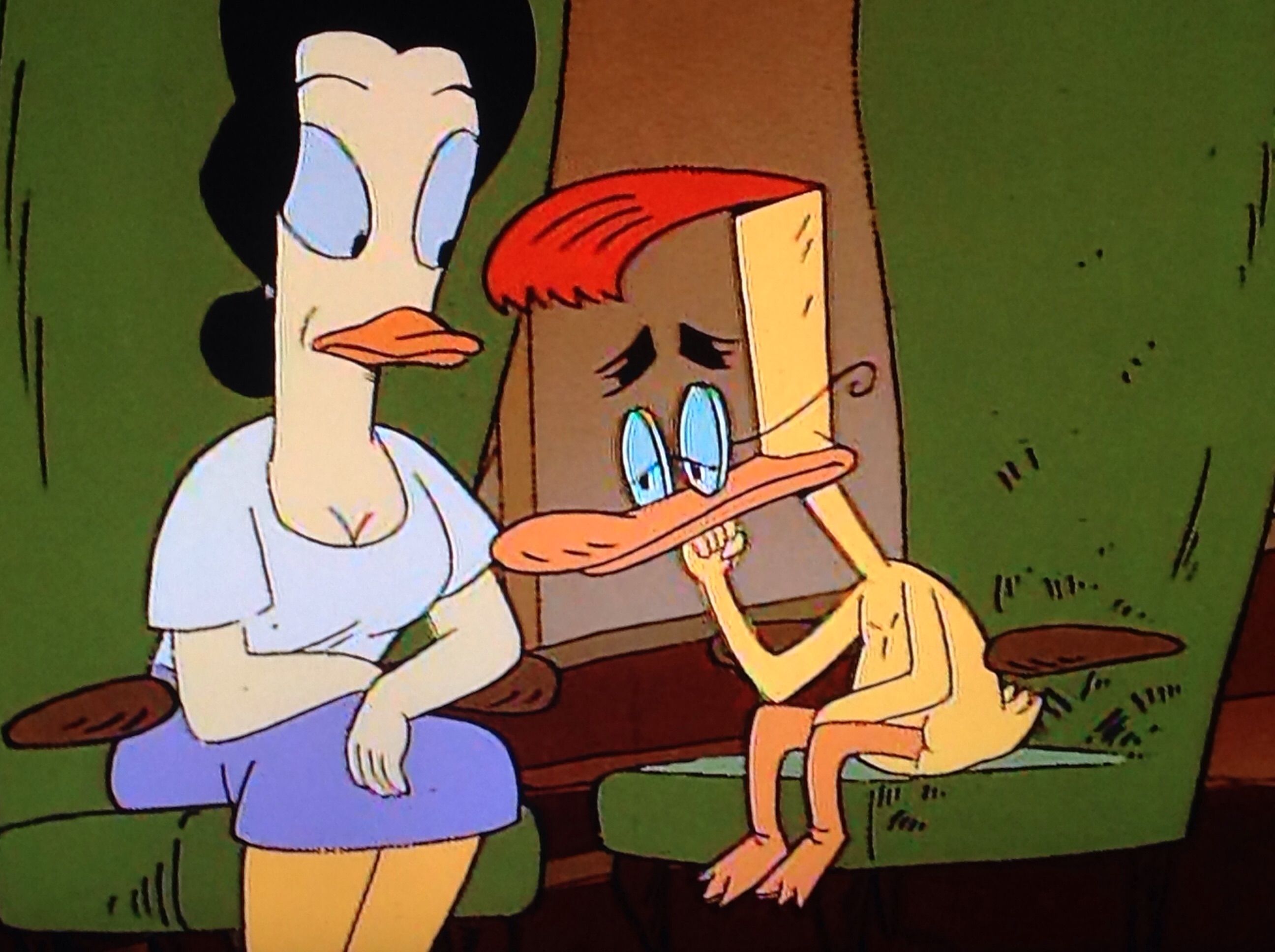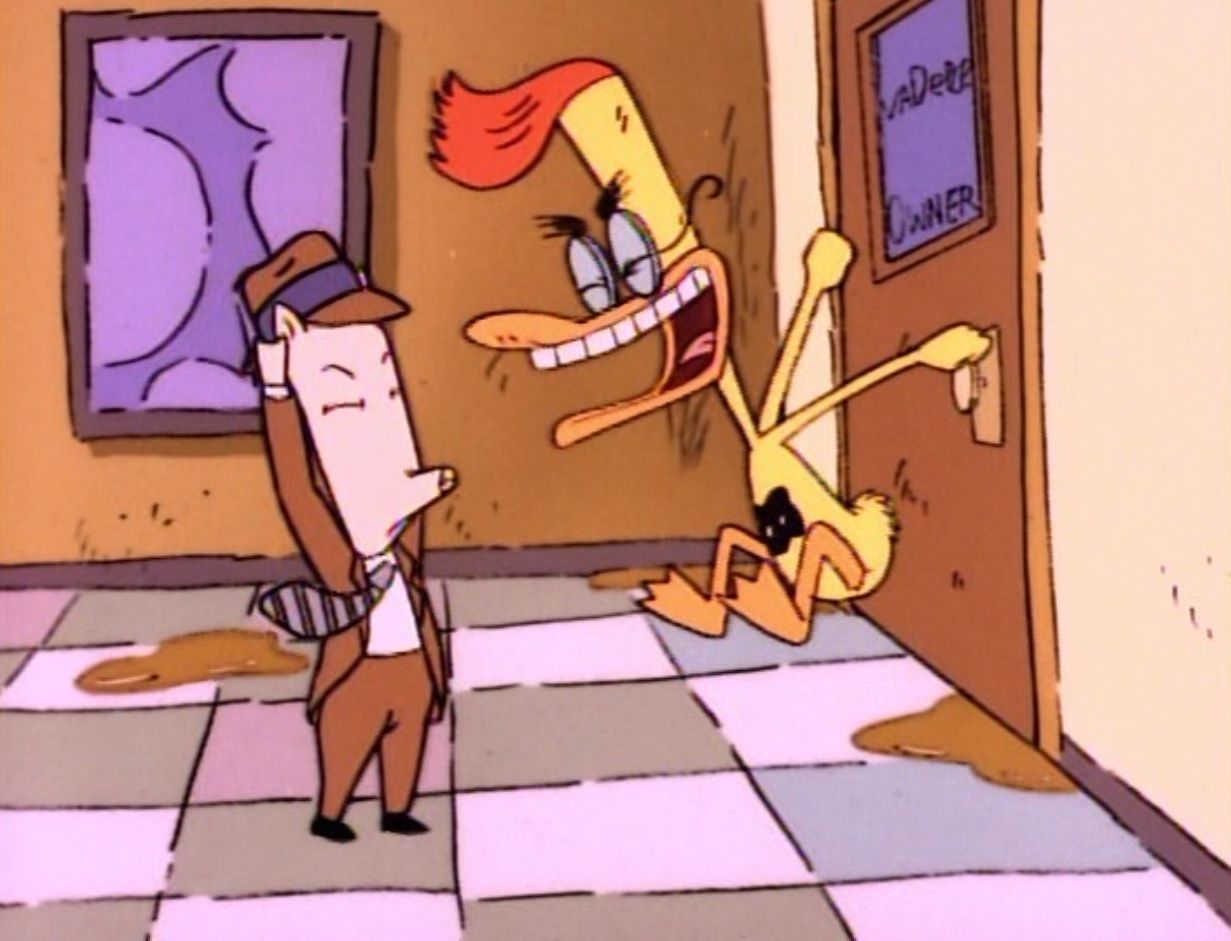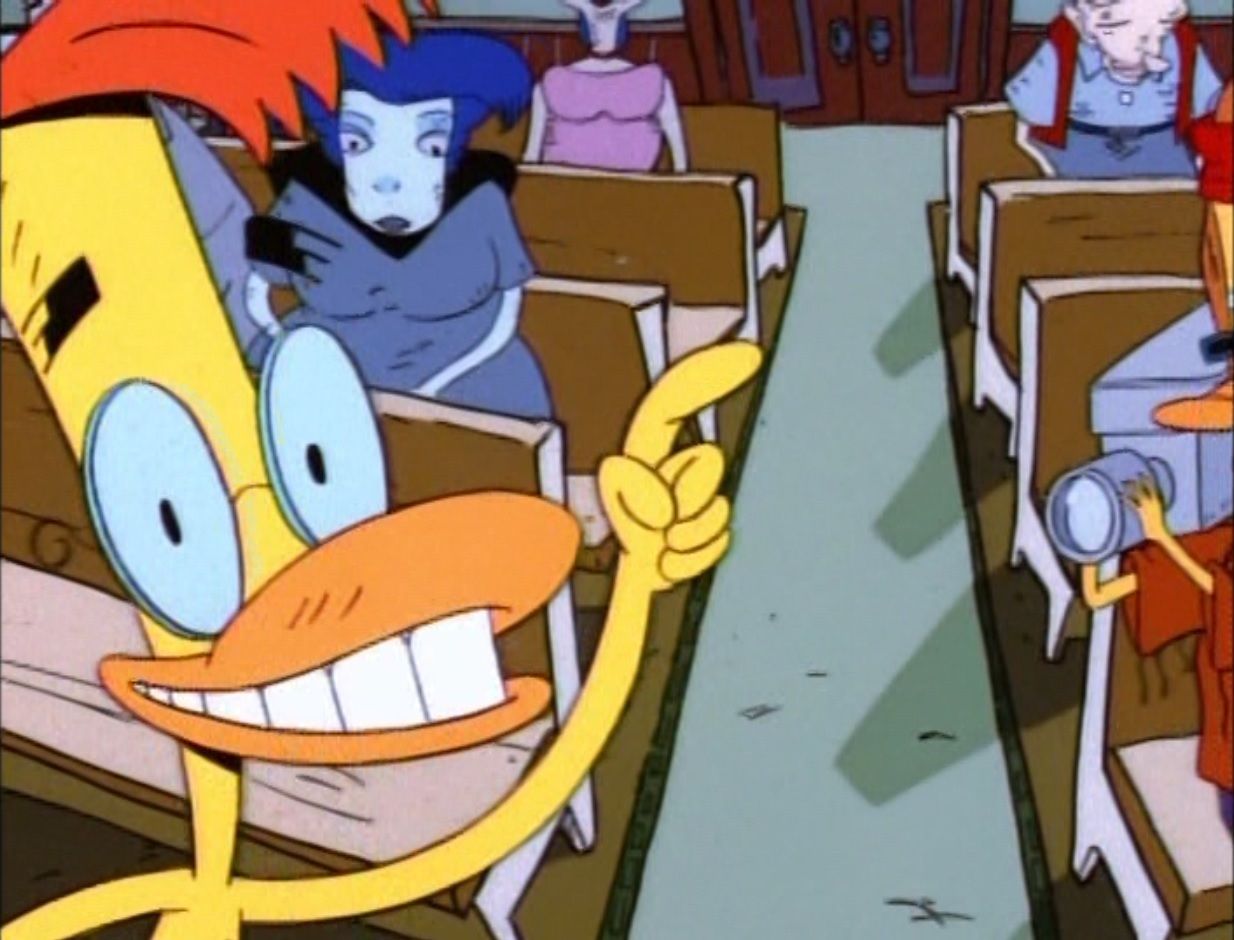Is it difficult to guess what followed the early 1990s success of The Simpsons? As FOX's ratings hit and merchandising goldmine dominated pop culture, countless obscure comics and cartoon properties got their shot as primetime programming. Typically, these shows aired on broadcast networks, where the budget constraints of animated projects were less of an issue. And, typically, these shows -- like Fish Police or Family Dog -- lasted only a few episodes before facing cancellation. However, the USA Network, known in the era mainly for WWF Wrestling broadcasts and repackaged sexplotation and B-movies on its Up All Night program, actually found more success creating its own Simpsons-inspired sitcom than any of the broadcast networks: Duckman.
Debuting on March 5, 1994, an adaptation of cartoonist Everett Peck's cult comic Duckman premiered. The show went on to earn several Emmys nominations, feature countless celebrity guest stars, and finish a four-season run of seventy episodes. However, the show is basically forgotten now.
Some of Duckman's early press labeled the comic as "underground" comix, akin to R. Crumb or Gilbert Shelton. Comics fans had to laugh at the description, given that the early Duckman comics were published by Dark Horse, a company firmly in the mainstream. The work, however, does have a look reminiscent of the underground. Although Peck's day job consisted of animation work on kids properties like The Real Ghostbusters, the early Duckman comics have a scratchy, loose feel to them.
1988's Dark Horse Presents #22 marked Duckman's debut. It's a two-page story that establishes the basics of the concept: Duckman's a short-tempered private investigator with a long-suffering, but unusually loyal, associate by the name of Cornfed Pig.
His next appearance was in #31 (June, 1989), a one-page gag strip that features Duckman dreaming of his assistants Fluffy and Uranus (parodies of the Snuggle Bear corporate mascot) reaping horrific punishment upon him for his abuse. Then, him waking up and deciding not to change his behavior anyway.
The Duckman one-shot from September, 1990 fleshes out the concept, and is pretty close to the Duckman we'll meet in the animated series. Heck, the cover even features the subtitle used for the show ("Private Dick/Family Man") and his cartoon catchphrase.
The comic introduces his family: a slow-witted teenager named Ajax, the younger sons Charles and Mambo (who are also conjoined twins, later reinvented on the show as child geniuses), and his live-in mother-in-law, Grandmama. One noticeable difference in the comic is the presence of Duckman's wife, Beatrice. On the show, Duckman is a widower. In fact, true to the show's humor, Duckman's actually indirectly responsible for her death, but he's too callous and self-unaware to feel any guilt about it.
Interestingly, in the show's flashbacks, Beatrice is portrayed as a saintly companion who offered Duckman nothing but unconditional love. In her singular comics appearance, Beatrice is an oblivious health nut, "a goofball '80s gal" with no real time for Duckman.
The Duckman one-shot features numerous stories, all with flimsy plots. Like the show, gags matter far more than any specific plot point, and virtually every event exists to provoke a hysterical reaction from Duckman. Peck's art isn't nearly as sketchy for most of the one-shot, and it's more evident now where the show's visual styling will evolve from. The comic also introduces the character deemed Duckman's greatest nemesis, an intentionally lame parody of an arch-enemy, King Chicken. The show continues with this gag, and even casts Tim Curry to play the villain.
Animation studio Klasky-Csupo saw immediate potential in Duckman, financing their own pilot in 1991. The show was eventually picked up by USA, and debuted in 1994 as a part of the network's Saturday night programming. The show was joined by a sitcom adaptation of Weird Science and the Animal House-inspired Campus Cops, all leading into Up All Night. It's evident USA had a mandate for these shows -- sex sells. Although one of the shorts in the Duckman one-shot briefly plays up a sexual angle, the rest of the Duckman comics material is pretty chaste. Duckman, the television show, establishes the hero's uncontrolled libido from the first episode, and for the early seasons, always conspires some means to feature female characters in states of undress.
The audience for this is hard to discern, given that Duckman's visuals have only a passing familiarity with true anatomy. The premise of Duckman's world has animals, humans, and animal-human hybrids all co-mingling, with every design intentionally exaggerated and distorted. The look is an amalgam of Peck's comics work and Klasky-Csupo's distinctive designs, even more grotesque than anything seen on Rugrats or Aaahh!!! Real Monsters. Not exactly the people you turn to for cheesecake.
One casualty of the "sexy" angle was Duckman's wife, Beatrice. It was decided during the show's development that more story possibilities (as in, more opportunities for Duckman to encounter scantily-clad females) existed if Duckman were single. Peck made the call to kill off Beatrice and replace her with a newly revealed sister. Beatrice's aerobics and health food-obsessions from the comic would now be given to her twin sister, Bernice. And though we're told Beatrice was an angel, Bernice is shrill, hateful, and openly disdainful of Duckman. Unfortunately for him, Beatrice willed her half of the house to Bernice, who rounds out the cast as a mother-figure to the family.
Duckman premiered with a healthy amount of promotion in 1994. The theme music came from the recently deceased Frank Zappa (his son Dweezil was also along as the voice of Ajax), and numerous celebrity guest stars had been lined up for the first season. The regular voice cast for Duckman is honestly impressive. Jason Alexander, at the height of his Seinfeld fame, voices the title character. Duckman is petty, self-centered and given to hysterics. He's basically George Costanza turned up to 11, making Alexander perfect for the role.
He's joined by animation veteran Gregg Berger, known to 1980s animation fans as the voice of Spirit on G. I. Joe, Grimlock on Transformers, and Odie on Garfield and Friends. Berger plays Cornfed as a parody of Dragnet's Joe Friday, which might seem to be a thin joke, but it becomes the strongest performance on the show. Berger's comedic timing is remarkable, and while Cornfed was merely a punching bag for Duckman in the comic, in the cartoon he's rounded out as a sensible yet likable partner, and the rare voice of moral clarity in this world.
One area where the show can't be faulted is the cast list. Players from The Simpsons like Maurice LaMarche and Joe Mantegna appear, along with seasoned voice-over talent like James Avery, Chuck McCann, E.G. Daily, and Dennis Haysbert. Comedians like Bobcat Goldthwait and Gilbert Gottfried are here, along with stunt-cast celebrities like Burt Reynolds, Brian Doyle-Murray, Ice T, and Estelle Getty. Writer/actor Ben Stein appeared so often, his character was simply named Ben Stein, though in this world he's a canine doctor. Leonard Nimoy even appears as himself in a quick live-action sequence, and an entire episode mocks the idea of celebrity guest spots by having Melrose Place star Courtney Thorne-Smith play herself in the role of Duckman's new TV star girlfriend.
Duckman is very much of its era, setting its sights on the 1990s incarnations of political correctness and censorship. The viewer is meant to see Duckman as deeply flawed, but go along with his antics and nod knowingly at jokes at the expense of busy-body censors and political hacks. In an era of social media callouts, it's hard to imagine any single episode remaining unscathed. The show isn't currently available for streaming, and if it were, it's not hard to imagine it facing a similar fate faced by far tamer, more modern shows like 30 Rock. Probably a third of these episodes would be pulled or censored in some way.
For a series that's over 25 years old, Duckman doesn't seem to be recognized as an influence on today's world of adult animation, yet it could easily be seen as a precursor to shows like Family Guy and Bojack Horseman. The series is as opposed to earnestness and consistent continuity as Family Guy, and features a lead just as damaged as Bojack. Unlike Bojack Horseman, however, there's rarely an attempt to make Duckman sympathetic. He's crass, rude and a horrible father, railing against a world he's convinced has wronged him in some way.
Amazingly, a series with four years and seventy episodes behind it, easily breaking the curse of every other show created during The Simpsons craze, has little fan presence online. The quality of the series does taper off as the years go on, with jokes becoming predictable and the lead character's schtick just wearing thin, but Duckman should've earned a cult following if only for its voice talent and sheer brazenness.
There are Duckman DVDs, but there's no call for a revival or for reruns to be picked up by a streaming service. The show even ended on a cliffhanger, but there's no talk about it being resolved. Anyone not around during this era likely has never heard of the show. 1990s nostalgia is a powerful force, but it seems to have overlooked the world's worst private dick/family man.
Hey, my latest novel Love is Dead(ly) is now free on Kindle Unlimited! Follow the adventures of Brad Burns, the Paranormal Desperado you either hate to love or love to hate.

